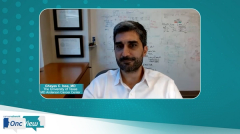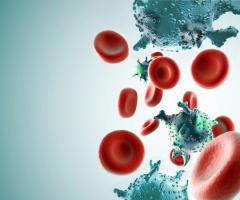
Recent Data in Relapsed/Refractory Acute Myeloid Leukemia
A medical oncologist reviews clinical trial data for revumenib and ziftomenib for patients with relapsed/refractory acute myeloid leukemia.
Episodes in this series

This is a video synopsis/summary of an OncView® featuring Ghayas C. Issa, MD.
Issa discusses emerging menin inhibitor data. Revumenib is an oral small molecule menin-KMT2A inhibitor taken twice daily. By disrupting the menin-KMT2A interaction it decreases leukemogenic gene expression, induces differentiation and demonstrates antileukemic effects. Early phase 1 first-in-human data showed a 60% response rate in heavily pretreated patients with 30% achieving complete remission/complete response. Confirmatory phase 2 data has since met the primary efficacy end point. Based on an approximately 25% complete response rate, FDA submission is planned. Adverse effects are mostly tolerable, including QTc prolongation (10%, grade 3+) and differentiation syndrome (15%, managed with steroids).
Ziftomenib is another menin inhibitor being studied, dosed once daily. Single-agent activity looked more promising for NPM1 mutant versus KMT2A-rearranged AML. Recently presented phase 1 data yielded 35% complete remission or complete remission with partial hematologic recovery in NPM1 cases, leading to differentiation syndrome sometimes requiring steroids. Otherwise the agents have minimal toxicities compared to chemotherapy. The main adverse effects are differentiation syndrome and QTc prolongation.
All trial efficacy data represents real-world outcomes, even being potentially lifesaving for some patients previously referred to hospice.
Video synopsis is AI-generated and reviewed by Cancer Network® editorial staff.
Newsletter
Stay up to date on recent advances in the multidisciplinary approach to cancer.






































